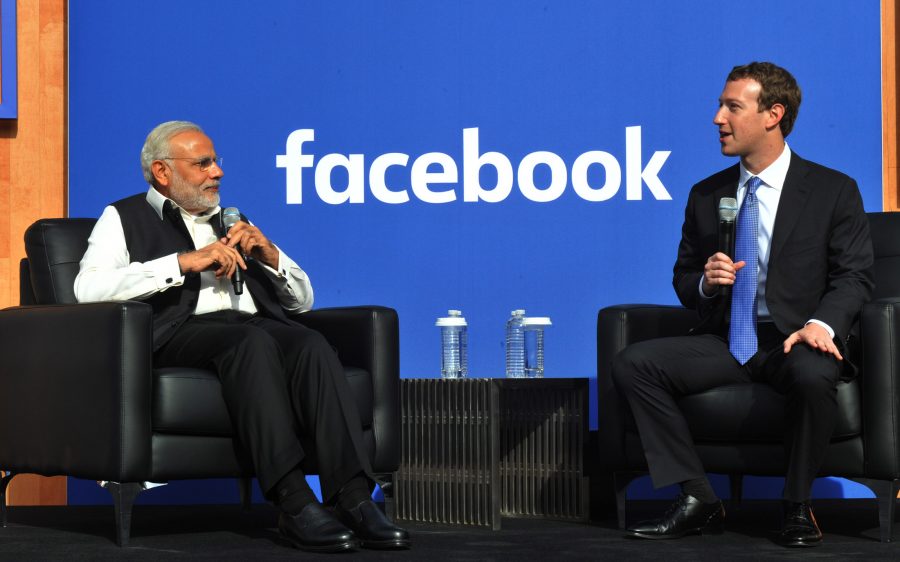Today’s Problem with Modern Philanthropy
Courtesy of Narendra Modi (Wiki Commons)
Mark Zuckerberg (right), CEO of Facebook, has donated money toward various issues, including education, technological advancement, and health.
Philanthropy is the market for love,” proclaimed author Dan Pallotta, “It is the market for all those people for whom there is no other market coming.” Mark Zuckerberg. Bill Gates. Marc Benioff. These icons of business and of philanthropy stick in our minds when we think of charitable giving. It is easy to see why. News reports, hospital buildings, dedicated plaques proclaim their names proudly, praising their noble contributions to the greater good. But behind the nice appearances and good intentions, philanthropy is a broken system of problem-solving.
In colonial times, Puritans designed our current system of charitable donation by monetary contributions. They were resistant to government taxation to take care of humanitarian issues, and wanted more control over their money, but as they denounced gluttony, the Puritans felt it necessary to donate their money somewhere. This gave the group an excuse to seek as much money as possible, under the excuse that they would donate that money.
Around the Gilded Age of the early 19th century, this form of charity evolved into the large scale philanthropy we see today. Business tycoons such as Andrew Carnegie and John D. Rockefeller created their own charitable foundations with boards of their own to pursue vague causes of concern for public life–without contribution from the public, of course. The foundations were tax-exempt, completely controlled by a small number of people, and were virtually indestructible.
Although it may be true that philanthropists advance the public good, the way in which they do so is inherently undemocratic. According to the New York Times, the government loses at least one dollar in tax revenue for every three dollars philanthropists give away due to tax breaks and deductions. While philanthropists may argue their donations are more effective than government tax dollars will be, wealthy people generally donate to organizations with which they are familiar. The New York Times reported in 2007 that over a period of five years, about 75 percent of charitable donations went to universities, hospitals, art museums, and private organizations. These donations may be bestowed with the very best of intentions, it is likely the public would disagree if Congress decided to shift their welfare funding to support an art museum. “When millions of people are dying of AIDS and malaria in Africa, it is hard to justify the umpteenth society gala held for the benefit of a performing arts center or an art museum,” billionaire William Gross criticizes. “A $30 million gift to a concert hall is not philanthropy, it is a Napoleonic coronation.”
Additionally, while philanthropic organizations are prohibited from donating money directly to political candidates, many organizations utilize loopholes to support certain candidates and agendas indirectly. In 2014, for example, the Atlantic cited philanthropic organizations as a primary reason for the failure of a push for affordable healthcare as they lobbied for a reduction in tax cuts after a period of relative silence during the Bush administration’s push for tax cuts and cuts on social programs. “The collective leadership of American philanthropy…found its voice only when its tax exemption was threatened,” expressed former member of the philanthropic industry Gara Lamarche, “in order to let rich, well-insured people go on shielding as much of their money as possible from taxation.”
The second main issue with philanthropy, when it does address is the most pressing social issues of our time, is that money simply is not as effective as time in solving social issues. It usurps the need for responsibility and accountability in achieving a goal, allowing philanthropic organizations to bask in the media publicity of donating immense amounts of money to a cause before moving on to another issue, without researching the donation properly or staying behind to ensure the donation was actually productive.
Our system for charitable giving discourages the responsible, effective pursuit of altruism among young people. When choosing future careers, salary may not be the only factor in a decision, but it is certainly a factor. And with crippling student loans right on the horizon, who would sacrifice hundreds of thousands of dollars annually to be CEO of a charity when philanthropy is allegedly the same thing? Additionally, there is a huge stigma around any perceived selfishness among employees of nonprofit organizations. Even spending on marketing to advance the organization’s cause is looked upon with disdain by contributors, let alone a pay raise for organization workers and leadership. “You know, you want to make 50 million dollars selling violent video games to kids, go for it,” says Pallotta during a TED Talk, We’ll put you on the cover of Wired magazine. But you want to make half a million dollars trying to cure kids of malaria, and you’re considered a parasite yourself.”
Rather than throwing money at problems, our world needs brainpower to address them. Take the Syrian refugee crisis, for example. Many individuals are resistant to admitting refugees into their nations under the premise that these refugees would rely on welfare and taxpayer dollars to support their transition. While refugees may initially need financial assistance, refugee programs such as those in Uganda have successfully integrated refugees and helped them gain independence by helping them create small businesses, assigning them to zones for alongside natives to better integrate them into society, and matching them with nations to fit their needs. This solution is not only less expensive than large donations in the long term, it is more sustainable. But it was not born out of the pocket change of billionaires, it was created by Alexander Betts, a leading expert on refugee economics who dedicated his life to these solutions. Had Betts, out of concern for his future financial security, decided to become a businessman instead, there would be no solutions. If our nation wants to be serious about service to those in need, the current system of philanthropy will never be effective.
Maybe the state of philanthropy is a remnant of the American dream, inciting an expectation of future wealth and a desire to have absolute control that fantastical fortune. Or maybe Americans have never considered the negative aspects of the industry. But in order to restore financial decisions to the hands of the public and to encourage a serious effort at really being conscious about our problem solving strategies, we must reform philanthropy.






